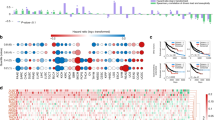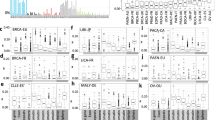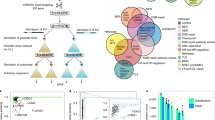Abstract
Accumulation of frameshift mutations at genes containing coding mononucleotide repeats is thought to be the major molecular mechanism by which mismatch repair-deficient cells accumulate functional alterations. These mutations resulting from microsatellite instability (MSI) can affect genes involved in pathways with a putative oncogenic role, but may also arise in genes without any expected role in MSI carcinogenesis because of the high mutation background of these tumours. We here screened 39 MSI colorectal tumours for the presence of mutations in 25 genes involved in DNA damage signalling and repair pathways. Using a maximum likelihood statistical method, these genes were divided into two different groups that differed significantly in their mutation frequencies, and likely represent mutations that do or do not provide selective pressure during MSI tumour progression. Interestingly, the so-called real-target mutational events were found to be distributed among genes involved in different functional pathways of the DNA metabolism, for example, DNA damage signalling (DNA-PKcs, ATR), double-strand break (DSB) repair (DNA-PKcs, RAD50), mismatch repair (MSH3, MSH6, MBD4) and replication (POLD3). In particular, mutations in MRE11 and/or RAD50 were observed in the vast majority of the tumours and resulted in the concomitant loss of immunohistochemical expression of both proteins. These data might explain why MSI colorectal cancers (CRC) behave differently in response to a wide variety of chemotherapeutic agents, notably those targeting DNA. More generally, they give further insights into how MSI leads to functional changes with synergistic effects in oncogenic pathways.
This is a preview of subscription content, access via your institution
Access options
Subscribe to this journal
Receive 50 print issues and online access
$259.00 per year
only $5.18 per issue
Buy this article
- Purchase on Springer Link
- Instant access to full article PDF
Prices may be subject to local taxes which are calculated during checkout




Similar content being viewed by others
References
Aaltonen LA, Peltomaki P, Leach FS, Sistonen P, Pylkkanen L, Mecklin JP et al. (1993). Clues to the pathogenesis of familial colorectal cancer. Science 260: 812–816.
Bartkova J, Horejsi Z, Koed K, Kramer A, Tort F, Zieger K et al. (2005). DNA damage response as a candidate anti-cancer barrier in early human tumorigenesis. Nature 434: 864–870.
Boland CR, Thibodeau SN, Hamilton SR, Sidransky D, Eshleman JR, Burt RW et al. (1998). A National Cancer Institute Workshop on Microsatellite Instability for cancer detection and familial predisposition: development of international criteria for the determination of microsatellite instability in colorectal cancer. Cancer Res 58: 5248–5257.
Brennetot C, Buhard O, Jourdan F, Flejou JF, Duval A, Hamelin R . (2005). Mononucleotide repeats BAT-26 and BAT-25 accurately detect MSI-H tumors and predict tumor content: implications for population screening. Int J Cancer 113: 446–450.
Duval A, Hamelin R . (2002). Mutations at coding repeat sequences in mismatch repair-deficient human cancers: toward a new concept of target genes for instability. Cancer Res 62: 2447–2454.
Duval A, Rolland S, Compoint A, Tubacher E, Iacopetta B, Thomas G et al. (2001). Evolution of instability at coding and non-coding repeat sequences in human MSI-H colorectal cancers. Hum Mol Genet 10: 513–518.
Fallik D, Borrini F, Boige V, Viguier J, Jacob S, Miquel C et al. (2003). Microsatellite instability is a predictive factor of the tumor response to irinotecan in patients with advanced colorectal cancer. Cancer Res 63: 5738–5744.
Giannini G, Rinaldi C, Ristori E, Ambrosini MI, Cerignoli F, Viel A et al. (2004). Mutations of an intronic repeat induce impaired MRE11 expression in primary human cancer with microsatellite instability. Oncogene 23: 2640–2647.
Giannini G, Ristori E, Cerignoli F, Rinaldi C, Zani M, Viel A et al. (2002). Human MRE11 is inactivated in mismatch repair-deficient cancers. EMBO Rep 3: 248–254.
Ionov Y, Peinado MA, Malkhosyan S, Shibata D, Perucho M . (1993). Ubiquitous somatic mutations in simple repeated sequences reveal a new mechanism for colonic carcinogenesis. Nature 363: 558–561.
Jacob S, Praz F . (2002). DNA mismatch repair defects: role in colorectal carcinogenesis. Biochimie 84: 27–47.
Jiricny J . (2006). The multifaceted mismatch-repair system. Nat Rev Mol Cell Biol 7: 335–346.
Li HR, Shagisultanova EI, Yamashita K, Piao Z, Perucho M, Malkhosyan SR . (2004). Hypersensitivity of tumor cell lines with microsatellite instability to DNA double strand break producing chemotherapeutic agent bleomycin. Cancer Res 64: 4760–4767.
Mori Y, Yin J, Rashid A, Leggett BA, Young J, Simms L et al. (2001). Instabilotyping: comprehensive identification of frameshift mutations caused by coding region microsatellite instability. Cancer Res 61: 6046–6049.
Ottini L, Falchetti M, Saieva C, De Marco M, Masala G, Zanna I et al. (2004). MRE11 expression is impaired in gastric cancer with microsatellite instability. Carcinogenesis 25: 2337–2343.
Pommier Y . (2006). Topoisomerase I inhibitors: camptothecins and beyond. Nat Rev Cancer 6: 789–802.
Sonoda E, Okada T, Zhao GY, Tateishi S, Araki K, Yamaizumi M et al. (2003). Multiple roles of Rev3, the catalytic subunit of polzeta in maintaining genome stability in vertebrates. EMBO J 22: 3188–3197.
Suzuki K, Dai T, Suzuki I, Dai Y, Yamashita K, Perucho M . (2002). Low mutation incidence in polymorphic noncoding short mononucleotide repeats in gastrointestinal cancer of the microsatellite mutator phenotype pathway. Cancer Res 62: 1961–1965.
Takemura H, Rao VA, Sordet O, Furuta T, Miao ZH, Meng L et al. (2006). Defective Mre11-dependent activation of Chk2 by ataxia telangiectasia mutated in colorectal carcinoma cells in response to replication-dependent DNA double strand breaks. J Biol Chem 281: 30814–30823.
Thibodeau SN, Bren G, Schaid D . (1993). Microsatellite instability in cancer of the proximal colon. Science 260: 816–819.
Woerner SM, Benner A, Sutter C, Schiller M, Yuan YP, Keller G et al. (2003). Pathogenesis of DNA repair-deficient cancers: a statistical meta-analysis of putative Real Common Target genes. Oncogene 22: 2226–2235.
Yanamadala S, Ljungman M . (2003). Potential role of MLH1 in the induction of p53 and apoptosis by blocking transcription on damaged DNA templates. Mol Cancer Res 1: 747–754.
Acknowledgements
We thank Dr Brigitte Bressac-de-Paillerets and Dr Sylviane Olschwang for sharing data, and Valérie Velasco, Nadine Leonard, Joëlle Lacombe and Olivier Buhard for their expert technical assistance. We also thank Dr Pierre Duvillard, Professor Pierre Netter and Dr Filippo Rosselli for constant support and stimulating discussions. Financial supports have been provided by the ‘Fondation pour la Recherche Médicale’ (to CM), the ‘Ministère de l'Education Nationale de la Recherche et de la Technologie’, and by the ‘Ligue Nationale contre le Cancer’ (to SJ) and the ‘Association pour la Recherche sur le Cancer’ (to JV). This research was granted by the ‘Association pour la Recherche sur le Cancer’ (#4683 and 3835 to FP).
Author information
Authors and Affiliations
Corresponding author
Rights and permissions
About this article
Cite this article
Miquel, C., Jacob, S., Grandjouan, S. et al. Frequent alteration of DNA damage signalling and repair pathways in human colorectal cancers with microsatellite instability. Oncogene 26, 5919–5926 (2007). https://doi.org/10.1038/sj.onc.1210419
Received:
Revised:
Accepted:
Published:
Issue Date:
DOI: https://doi.org/10.1038/sj.onc.1210419
Keywords
This article is cited by
-
MBD4 loss results in global reactivation of promoters and retroelements with low methylated CpG density
Journal of Experimental & Clinical Cancer Research (2023)
-
The epigenetic modifier HDAC2 and the checkpoint kinase ATM determine the responses of microsatellite instable colorectal cancer cells to 5-fluorouracil
Cell Biology and Toxicology (2023)
-
Potential risks associated with the use of ionizing radiation for imaging and treatment of colorectal cancer in Lynch syndrome patients
Familial Cancer (2023)
-
Probiotics and Prebiotics Having Broad Spectrum Anticancer Therapeutic Potential: Recent Trends and Future Perspectives
Current Pharmacology Reports (2021)
-
Fisetin inhibits proliferation of pancreatic adenocarcinoma by inducing DNA damage via RFXAP/KDM4A-dependent histone H3K36 demethylation
Cell Death & Disease (2020)



